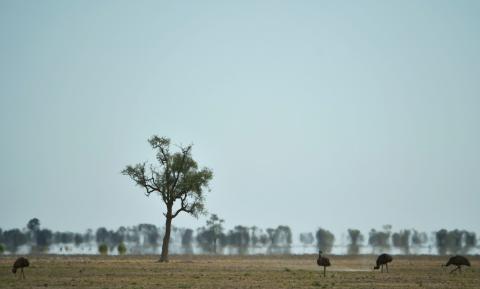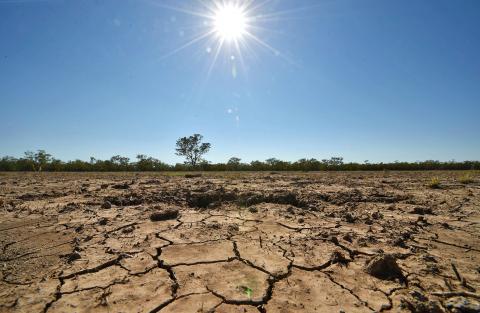On the road to Walgett a sign welcomes visitors: “Farming is not a way of life, it keeps everyone alive.” But with drought taking a heavy toll on the region, farming has become a battle for survival.
The Australian agricultural town — which takes its name from the Aboriginal word meaning the meeting of two rivers — is in the grip of the worst drought in a century, with disillusioned farmers battling to stay afloat.
Three wet seasons have come and gone with hardly a drop of rain. Green floodplains have become endless expanses of cracked brown earth. Along roads lined with wooden stakes set up to measure water levels, instead plumes of dust rise between the feet of passing emus. The horizon shimmers in a haze of heat.

Photo: AFP
“It’s a game of chess in every direction to try to survive — it’s a game of survival,” Wayne Newton, a farmer from the remote town some 650km northwest of Sydney, told AFP.
“The mornings are the worst because you don’t know what’s in front of you and you know it’s going to be a grueling day. “What really gets you down is if you’ve got to put a cow down or something that’s been too affected. It just builds, the constant pressure and no relief.”
Chris Clemson, who has helped farmers sell their livestock for almost two decades, said even hardened and experienced landowners were struggling.

Photo: AFP
“I’ve had some really big, solid farmers say to me if it doesn’t rain, they’ll have to walk,” he said.
Australia — one of the world’s largest red meat producers and exporters — had its hottest year on record in 2013, while last year was third warmest.
This is putting fresh strain on farmers in areas like Walgett, in the south-eastern state of New South Wales. The region was hit by drought for most of the first decade of this century. The current dry period spans NSW and Queensland — an area bigger than France.
“We had droughts 2001 to 2008, then we had three years off and then we are back in it again,” said Bill Murray, whose family has farmed a large tract of land about an hour’s drive west of Walgett for 150 years. “And that’s hard.”
Adding to their despair, an Australian study last year forecast climate change would lead to less rainfall in the nation’s south — and more severe droughts.
EMOTIONAL, FINANCIAL TOLL
Salvation Army rural chaplain Lloyd Graham said communities in Walgett and in the town north, Lightning Ridge, were “very low in spirits.”
“You have husband and wife at each other’s throats and you have families that are bickering about it, and the drought causes that much stress that it all comes out in the open,” he said.
But the increased availability of mental health services has helped struggling families to cope this time, he added. While there are no known cases of suicide in Walgett due to drought, it is a big issue for rural communities in the country.
An Australian National University study on the link between suicide and drought in NSW from 1970 to 2007, published in 2012, found “clear evidence” to support a 15 percent increased risk of suicide for rural men aged between 30 and 49 as farming conditions worsen.
Trevor Hazell, a rural mental health expert at the University of Newcastle, said what was missing were longer-term studies on the impact of living under drought conditions.
“There is social research during the time of drought, but as soon as the drought breaks, the research stops,” he said.
MORE ASSISTANCE NEEDED
With 80 percent of the Walgett area’s income from agriculture, Murray has watched locals increasingly struggle with financial as well as emotional problems during his recent three-year stint as mayor.
“In 2010-11, this shire was the third-highest in agricultural production in NSW,” Murray said as temperatures of 40 degrees Celsius scorched his property.
“(Now) we are at the bottom of the list. We’ve gone from a rooster to a feather duster.”
Walgett, home to the largest grain receival depot in the southern hemisphere, now produces no wheat.
Just over a decade ago, the area had 1.2 million sheep and 89,000 cattle. Now there are 200,700 sheep and 23,000 cattle, Clemson said.
This has driven workers to leave for employment in regional cities, while families who send their children to boarding schools have moved away in search of lower costs, devastating already struggling towns.
Calls for more assistance are growing amid reports lenders have tightened the screws on debt-laden farmers, with Agriculture Minister Barnaby Joyce urging banks to stop foreclosing on farms.
“We don’t want people tossed off the land because of the drought and we’ve stayed in close communication with the banks,” Joyce told AFP, adding that two of the nation’s biggest lenders, Commonwealth Bank and ANZ, pledged to show restraint.
The government, meanwhile, has introduced new drought loans and cut interest rates for such schemes with National Farmers’ Federation president Brent Finlay saying: “These people are under a huge amount of stress... a lot is just trying to help people through this.”

Growing up in a rural, religious community in western Canada, Kyle McCarthy loved hockey, but once he came out at 19, he quit, convinced being openly gay and an active player was untenable. So the 32-year-old says he is “very surprised” by the runaway success of Heated Rivalry, a Canadian-made series about the romance between two closeted gay players in a sport that has historically made gay men feel unwelcome. Ben Baby, the 43-year-old commissioner of the Toronto Gay Hockey Association (TGHA), calls the success of the show — which has catapulted its young lead actors to stardom -- “shocking,” and says

The 2018 nine-in-one local elections were a wild ride that no one saw coming. Entering that year, the Chinese Nationalist Party (KMT) was demoralized and in disarray — and fearing an existential crisis. By the end of the year, the party was riding high and swept most of the country in a landslide, including toppling the Democratic Progressive Party (DPP) in their Kaohsiung stronghold. Could something like that happen again on the DPP side in this year’s nine-in-one elections? The short answer is not exactly; the conditions were very specific. However, it does illustrate how swiftly every assumption early in an

Inside an ordinary-looking townhouse on a narrow road in central Kaohsiung, Tsai A-li (蔡阿李) raised her three children alone for 15 years. As far as the children knew, their father was away working in the US. They were kept in the dark for as long as possible by their mother, for the truth was perhaps too sad and unjust for their young minds to bear. The family home of White Terror victim Ko Chi-hua (柯旗化) is now open to the public. Admission is free and it is just a short walk from the Kaohsiung train station. Walk two blocks south along Jhongshan

Francis William White, an Englishman who late in the 1860s served as Commissioner of the Imperial Customs Service in Tainan, published the tale of a jaunt he took one winter in 1868: A visit to the interior of south Formosa (1870). White’s journey took him into the mountains, where he mused on the difficult terrain and the ease with which his little group could be ambushed in the crags and dense vegetation. At one point he stays at the house of a local near a stream on the border of indigenous territory: “Their matchlocks, which were kept in excellent order,